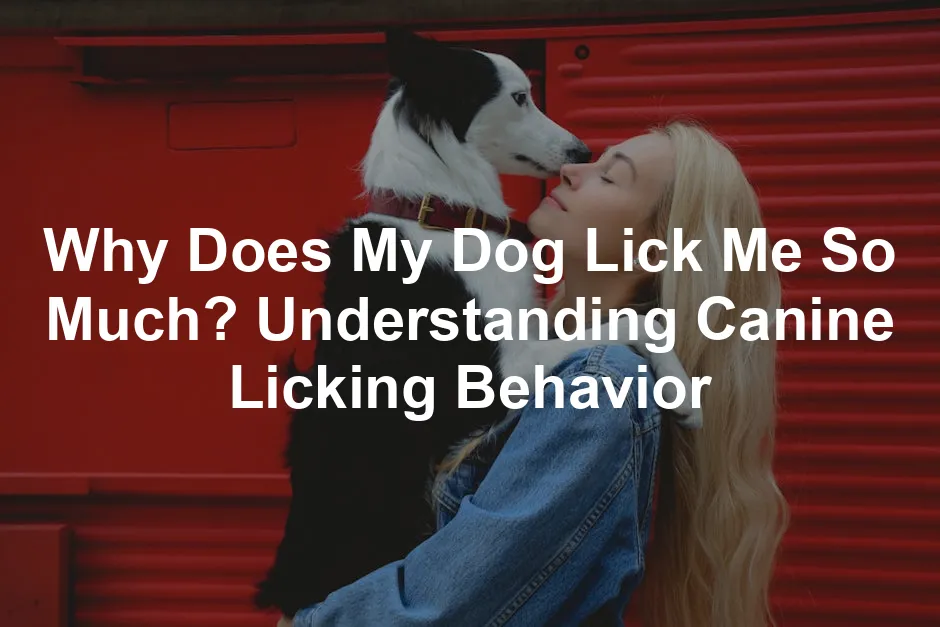Introduction
Have you ever wondered why your dog can’t stop licking you? This common behavior often leaves pet owners curious. Is it a sign of affection, or something else entirely? Let’s take a closer look at the reasons behind this doggy habit.
Summary and Overview
Dog licking is a multifaceted behavior. It can signify affection and communication or even indicate health issues. Understanding why your dog licks you is crucial for a stronger bond between you both. In this post, we’ll unravel the various reasons behind licking. Get ready to discover what your furry friend is trying to tell you!
Speaking of bonding, providing your dog with the right treats can reinforce that connection. Consider using Dog Training Treats. They are not just tasty; they can help reinforce good behavior, making training sessions more effective and fun!
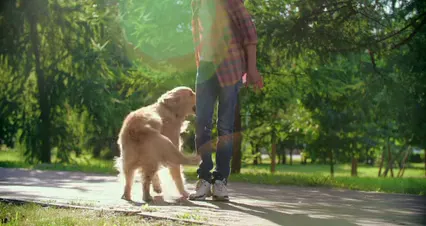
Reasons Why Dogs Lick Their Owners
Affection and Bonding
Licking often starts in puppyhood. Puppies lick their mothers to bond and seek comfort. This early behavior translates into affection for their owners. When your dog licks you, they feel secure and loved. The act also releases endorphins, making your furry friend feel calm and happy. This simple gesture strengthens your emotional connection.
Communication and Attention-Seeking
Dogs are communicators. Licking can signal a need for attention or a desire to play. If your dog licks you, they might be trying to express their needs. This behavior can also indicate hunger or boredom. By licking, your canine companion hopes to engage you in interaction. Observing the context can reveal what your pup wants.
Taste and Sensory Exploration
Dogs experience their world primarily through taste and smell. Their tongues are powerful tools for exploration. When your dog licks you, they gather information about their environment. This behavior is similar to how we use our hands. Your skin may have salty residues from sweat or food. These flavors can be enticing for dogs, prompting them to lick more. So, if your dog is licking, they might just find you delicious!

To keep their taste buds entertained, consider investing in an Interactive Dog Puzzle Toy. These toys stimulate your dog’s mind and keep them engaged, reducing boredom and destructive behavior.
Stress Relief and Anxiety
For some dogs, licking serves as a calming mechanism. When feeling anxious, dogs often engage in repetitive behaviors. Licking can be a soothing activity that helps them cope. This behavior releases endorphins, creating a sense of comfort. If your dog licks excessively during stressful situations, it may indicate anxiety. Recognizing this pattern can help you provide better support for your furry friend. For more information on managing anxiety in dogs, check out these dog training tips for adopting a rescue dog with anxiety.

In addition to training, a Dog Anxiety Vest can provide comfort during stressful times, helping them feel safe and secure.
Medical Reasons for Excessive Licking
Excessive licking can sometimes signal underlying health issues. Conditions like allergies or infections can cause discomfort. Dogs might lick to soothe irritated skin or areas of pain. Gastrointestinal problems may also lead to increased licking behaviors. If your dog’s licking seems unusual or excessive, it’s wise to consult a veterinarian. They can help identify any health concerns and provide appropriate treatment.
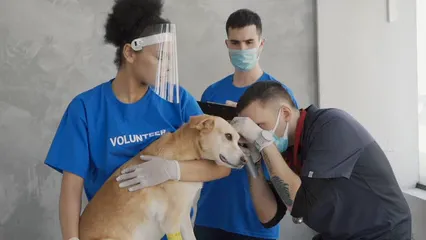
When Licking Becomes a Problem
Identifying Excessive Licking
Understanding what constitutes excessive licking is crucial. Normal licking is common and often harmless. However, excessive licking may become problematic. If your dog licks persistently to the point of causing harm, it’s time to take notice. Pay attention to patterns and contexts of licking behavior. Identifying when it crosses the line can help you address potential issues effectively.
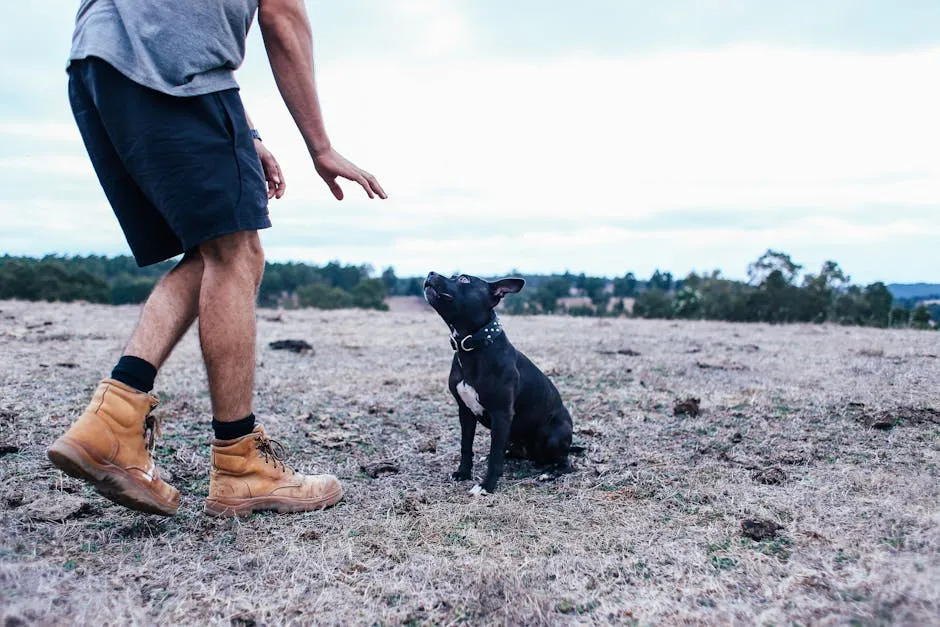
Behavioral Interventions for Excessive Licking
If your dog’s licking becomes excessive, don’t worry! There are effective training techniques to help manage this behavior. Start by redirecting your dog’s attention when they lick you. Use engaging toys or activities to shift their focus. For example, a puzzle toy filled with treats can keep them busy.
Positive reinforcement is key. Reward your dog when they engage in alternative behaviors, like playing or sitting quietly. This encourages them to repeat those desired actions instead of licking. Consistency is vital! Reinforce good behavior every time, so your dog understands what you want. For stubborn dogs, consider exploring effective positive reinforcement techniques.
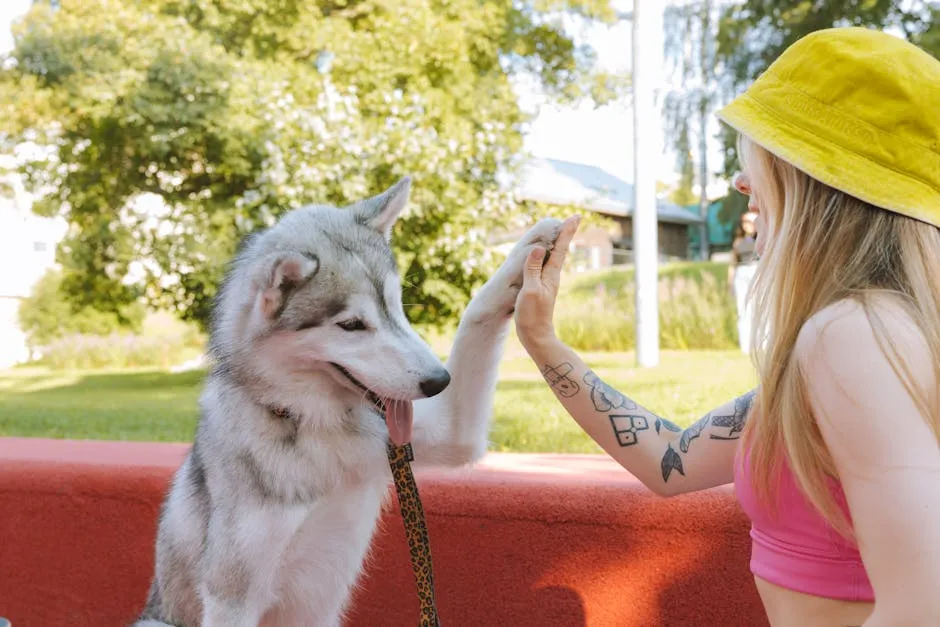
To make training easier, you might find it helpful to use a Dog Training Clicker. This handy tool can help signal to your dog when they’ve done something great, making training a breeze!
Using positive reinforcement can be very effective in training your dog. effective positive reinforcement techniques
Understanding Your Dog’s Behavior
Observational Techniques
Pay close attention to your dog’s licking patterns. Observe when and where they lick the most. Keeping a journal can help you track these instances. You might discover specific triggers like stress, boredom, or excitement. Identifying these patterns allows you to address the underlying causes effectively.

The Role of Environment
Your dog’s environment plays a crucial role in their licking behavior. Changes in routine, like moving to a new home or introducing a new pet, can lead to increased licking. Stressors, such as loud noises or unfamiliar visitors, might also trigger this behavior. By recognizing these environmental factors, you can create a calmer space for your dog. Consider providing a safe retreat where they can relax during stressful situations.

And speaking of creating a calm environment, a Dog Licking Mat can be a fantastic tool! It keeps them occupied and helps reduce anxiety, making it a win-win for both of you.
FAQs
Why does my dog lick my face?
Dogs often lick your face as a way to express affection. This behavior is instinctual; puppies lick their mothers to signal hunger. Your face may also taste appealing, especially if you’ve just eaten. It’s a combination of love and curiosity that makes your pup want to lick you.
Is it normal for dogs to lick excessively?
While occasional licking is typical, excessive licking can be a concern. Normal licking is usually harmless and may be part of their communication. However, if your dog licks obsessively, it could indicate anxiety or a medical issue. Monitoring the frequency and context helps determine if it’s a problem.
How can I stop my dog from licking me so much?
To reduce excessive licking, redirect your dog’s attention. Engage them with toys or activities that capture their interest. Positive reinforcement works wonders; praise and reward them when they choose not to lick. Consistency is crucial, so ensure everyone in the household follows the same approach.
Could my dog’s licking indicate a health issue?
Sometimes, your dog’s licking can signal health problems. Look for signs like excessive licking of specific areas, which may indicate pain or irritation. If your dog licks more than usual and seems restless, it could be discomfort. Watch for changes in appetite or unusual behavior as well. These may suggest allergies, infections, or gastrointestinal issues. Always consult your veterinarian if you notice these signs. Early detection can lead to better outcomes for your dog’s health.
What should I do if my dog licks open wounds?
If your dog licks an open wound, hygiene is crucial. Clean the area gently with mild soap and water. Avoid using harsh chemicals that could irritate the wound. Cover the wound with a bandage to prevent further licking. If the licking persists or if the wound looks red and swollen, seek veterinary advice promptly. Infections can develop quickly. Your vet may recommend an Elizabethan collar to stop licking while the wound heals.
Why do dogs lick their paws or legs?
Licking paws or legs can stem from several reasons. Allergies are a common cause; pollen, dust, or certain foods can trigger irritation. Dogs may also lick due to boredom or anxiety, seeking comfort in the repetitive action. Grooming is another reason; dogs often clean themselves this way. If your dog licks excessively, check for signs of redness or swelling. Consult your vet for advice on managing allergies or addressing behavioral issues.
Does licking have any health benefits for dogs?
Yes, licking can offer health benefits for dogs! It can be a soothing behavior, providing comfort during stressful situations. The act of licking releases endorphins, which can help reduce anxiety. This self-soothing technique helps dogs cope with discomfort or fear. Some dogs may even lick specific items for calming effects. However, moderation is key. If licking becomes excessive, it might indicate deeper issues. Always monitor your dog’s behavior closely to ensure their well-being.
To keep your dog’s health in check, consider having a Dog First Aid Kit on hand. It’s always better to be prepared for any unexpected mishaps!
Please let us know what you think about our content by leaving a comment down below!
Thank you for reading till here 🙂
All images from Pexels

